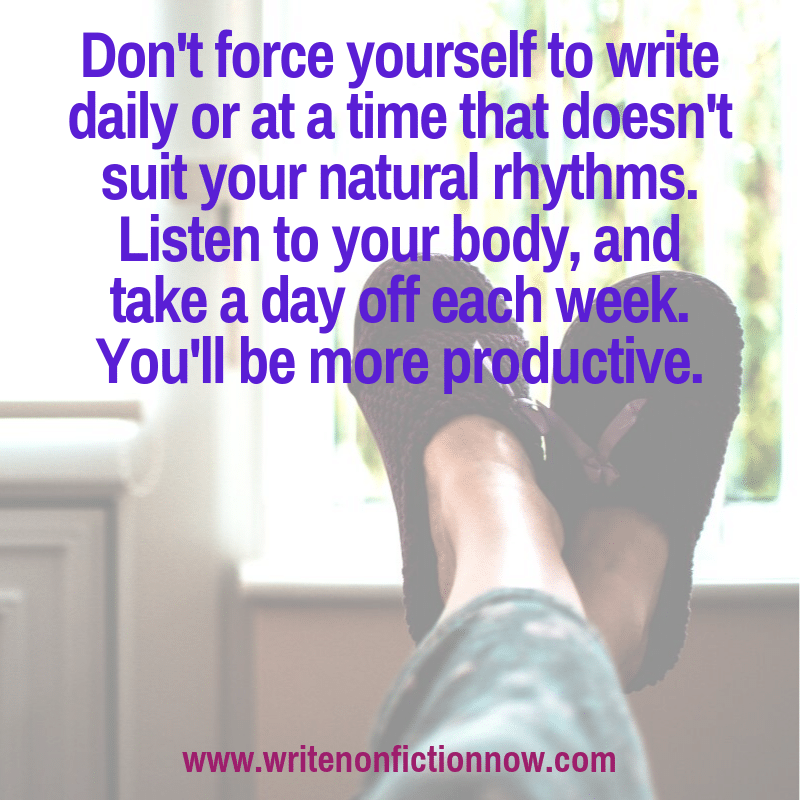Does it sometimes feel like it takes you forever to write a piece? Even if it’s short?
We’ve all been there. The clock seems to spin like a top, while you struggle to find your writing mojo. It’s like swimming through Jell-O, and at the end of the day, you’re lucky to have a couple of sentences strung together.
That doesn’t make you want to sit down and write the next day, does it?
If you’d like writing to get easier, I’ve got two proven strategies you can use. Each one can help you become a more efficient writer, but you’ll get best results using them both.
It’s About Time
You’ve probably noticed that many animals live on a schedule. Owls are active at night. The deer come out at dawn to graze. Fish know when to swim upstream and mate.
These natural rhythms are known as chronobiology—the inborn clock that tells animals the best time to wake up, hunt, eat, sleep, mate.
People have that internal clock, too. The funny thing is, though, we’re not all alike. Some of us are more productive at one time of day, some at others.
The trick is to discover your optimal chronobiology for creativity, and then take advantage of your best times to write.
For me, I’m super-sharp and full of ideas anywhere from about 5:30 a.m. up until lunchtime. About 4 p.m., I seem to catch a second wind. Then, I can crank out writing quickly through until about 9 p.m.
In other words, I could write something in an hour flat around 6:30 am let’s say.… or I could spend three hours slogging through it at 2 p.m. If I organize my day so my writing block falls in one of my better times—instead of trying to force out some words during my slow time—productivity jumps.
Optimize Your Schedule
If you don’t have a sense of when your most productive writing times are, start keeping a journal. Report what you tried to write and how easy or hard it was. Soon, you should see patterns in when writing is easy for you and when it’s hard.
Some people write great after midnight, some at two in the afternoon. Find your sweet spot.
Then, rearrange your writing schedule to put your writing at your best creative times. Stop hitting Facebook, or responding to email, or taking client meetings in your prime writing time. Shift other tasks to your less-useful blocks of time for writing.
Once your schedule is reorganized this way, more of your writing should flow easily and get done quickly. And you’ll be more likely to develop a writing habit.
There’s one more tweak you can make to your work schedule that’ll make your writing productivity soar. This is how I’ve produced thousands of articles and blog posts, for many years at a rate of three to four fully reported stories a week.
A Vacation Every Week
Ever wish you had more time off, but you feel you can’t take time away?
Here’s a tip: You can. I take at least one full day of deeply restful vacation each week. It’s an ancient tradition that’s never been more needed than it is today, in our 24/7, always-online culture.
It’s called the Sabbath. A day of rest. Perhaps you’ve heard of it?
For those of us in blogging or online business, a day off can be hard to find. You feel the need to quickly respond to comments or tweets. But I’ve proven you don’t really have to, even though your online business is on all the time.
My About pages on my sites note that I’m always off on Saturdays. Get back to ya later!
I’ve never had a single complaint. Instead, people applaud my dedication to work/life balance.
How does a day off transform your productivity? The secret is to make this day deeply restful, so you come roaring back and are super-productive.
Take It Off—All the Way Off
You get to choose how many days you write per week. If you write seven days a week, week after week, you’re riding the burnout train. The longer you work without a break, the less productive you become. You’re like a clock that’s never being wound, slowly running down.
Perhaps you’ve noticed it’s getting harder to keep writing daily? That’s a sign you need to get a day off back into your life. Not now and then, but as a regular habit.
Workaholism is an epidemic in the online-writing world. But you can take your life back.
Often, writers tell me they take a day off. But when I ask for details, it turns out they’re still checking email or Twitter or their blog’s comments, or perhaps popping on to churn out a quick blog post.
That means you’re not really resting your brain from your writing life. The trick is to truly leave it all behind.
I know, a lot of big gurus tell you to write every day. I say, try writing six days a week instead.
During my day off, all my devices are off. And it goes deeper than that.
On my day off, I don’t think about work, make lists, or plan things I’ll do when work resumes. I am mentally far away from my work life, engaged in entirely different activities—gardening, attending services, going for walks or bike rides, sharing time with family and friends.
In that day, I spend my time doing things that give me joy and allow me to return to my writing with fresh energy and new eyes.
It’s scary when you first try this out, because you think you’re not going to get all your work done. After all, it’s always taken seven days to do it!
But what really happens is that you’re so refreshed by the day off that your productivity soars. You get it all done in less time than it used to take.
Make Less Space, Get More Done
By taking a day and setting it aside as a “no work” day, you’ve removed a big block of time from your work life.
Have you ever noticed that work has a tendency to expand to fill all the available space you give it? I call this a Newtonian Law of freelance writing.
When you know you’re going to be at the computer every day, all week, endlessly working, it’s stressful. So a lot of procrastination happens. Hey, I’ve got time to hit Longreads and find an inspiring long feature story to read or to poke around Facebook for an hour, right?
When you know you’ve gotta finish by Friday so you can take your day off…well, then you tend to put your head down and write. Now, you’re dangling a reward—free time! And that tends to motivate people.
Let me just say this: I don’t know anyone who’s started a practice of taking a day off who ever went back to working 24/7. Develop a habit of examining and optimizing your writing time, and you’ll keep growing more productive—and you’ll develop a habit of actually writing on the days you choose to write.
Do you listen to your natural rhythms or take a day off to optimize your writing productivity? Tell me in a comment below. And if you found this post useful, please share it!
About the Author
 Carol Tice founded the award-winning Make a Living Writing blog in 2008, and the Freelance Writers Den learning and support community in 2011.
Carol Tice founded the award-winning Make a Living Writing blog in 2008, and the Freelance Writers Den learning and support community in 2011.
 Would you like to write and publish nonfiction, like articles, blog posts, books, or reports? Check out the Nonfiction Writers’ University. Get the basic education you need and the coaching to support your success as a nonfiction writer. Take advantage of monthly live educational and group coaching events. Enjoy a 30-day trial membership for only $1.
Would you like to write and publish nonfiction, like articles, blog posts, books, or reports? Check out the Nonfiction Writers’ University. Get the basic education you need and the coaching to support your success as a nonfiction writer. Take advantage of monthly live educational and group coaching events. Enjoy a 30-day trial membership for only $1.
Do you want a more advanced approach to your nonfiction writing education (including proven strategies to help you write consistently)? Join the Nonfiction Writers’ Univeristy MASTERS program. Receive ongoing live Certified High Performance Coaching, Author Training, and Authorprenuership Training as well as monthly educational and group coaching events. Learn all the steps to becoming a successful—and profitable—author. Discover how (finally) to write consistently, boldly, enthusiastically, and productively. Develop the mindsets, strategies, habits of the world’s most successful writers. Click here to learn more.

Marcin says
Listen to your natural rhythms is tied with your personality. That is, you’re either night owl or an early bird.